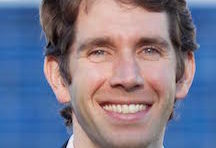Letter to the Editor: Clean-Energy Economy Equals Climate and Economic Opportunity
- Share
- Tweet
- Pin
- Share
There’s a multitude of reasons to support and participate in growing a clean-energy economy. There are many individuals and groups that are realizing it’s in their self-interest to “come to the table or be on the menu” when energy and climate policy are addressed. Youth, purple Republicans and the business community represent noteworthy players asking for a seat at the table.
Steve Melink’s new book Fusion Capitalism: A Clean Energy Vision for Conservatives offers a compelling story. He self-identifies as a conservative, business leader, Catholic and patriot. Melink writes that a changing climate and current technological innovations represent the “greatest economic opportunity of the 21st century. The sooner we put a price on carbon, the safer, healthier and wealthier we will be.”
Another inspiring example is Nick Huey, a recent BYU graduate. As a young father, Huey states that nurturing each of his babies as they have come into this world of climate uncertainty has made him concerned for their future. He describes himself as a Republican, Mormon and Christian.
Huey testified passionately with two other conservatives in 2019 in front of a Senate committee, sharing their concerns and solutions. Huey’s solution is for elected officials to embrace the radical “far middle” and move forward on climate issues. He eloquently explained that climate change is a symptom of a broken political system in which reason, humility and respect have been given short shrift.
Doug McMillen, Walmart CEO and chair of the Business Roundtable – representing more than 200 CEOs nationwide – has announced new principles and policies to address climate change. The Business Roundtable’s statement implores a market-based solution, including a price on carbon.
Such a program can be self-funding while not increasing the size of the government. Citizens’ Climate Lobby’s current household study shows that 68 percent of individuals in the U.S. end up receiving more than enough in monthly carbon dividends to offset their increased costs.
Although a carbon fee and dividend are not an economic or climate panacea, they are a bipartisan start.
John Hermanson
Sturgeon Bay, Wisconsin

